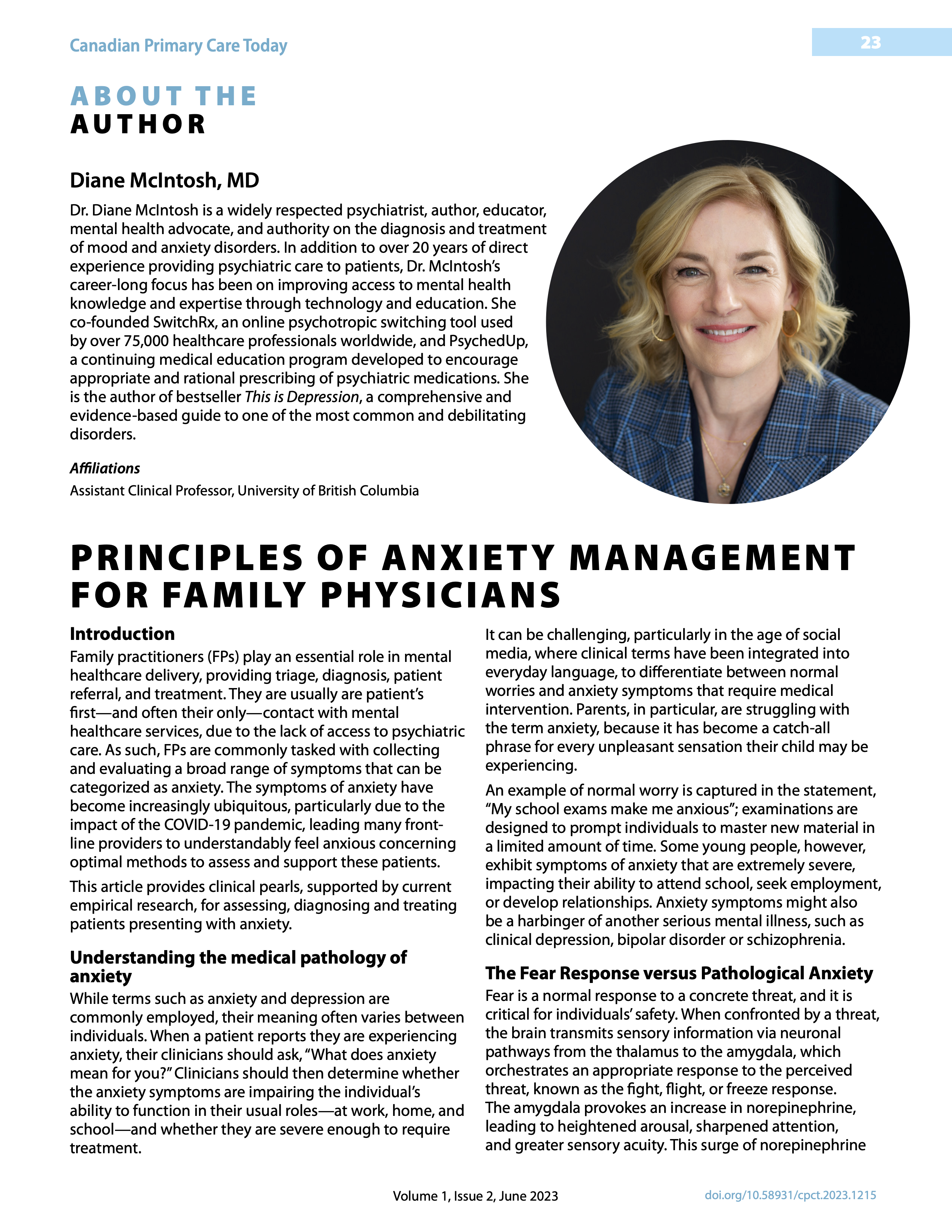Principles of anxiety management for family physicians
DOI:
https://doi.org/10.58931/cpct.2023.1215Abstract
Family practitioners (FPs) play an essential role in mental healthcare delivery, providing triage, diagnosis, patient referral, and treatment. They are usually are patient’s first—and often their only—contact with mental healthcare services, due to the lack of access to psychiatric care. As such, FPs are commonly tasked with collecting and evaluating a broad range of symptoms that can be categorized as anxiety. The symptoms of anxiety have become increasingly ubiquitous, particularly due to the impact of the COVID-19 pandemic, leading many front-line providers to understandably feel anxious concerning optimal methods to assess and support these patients.
This article provides clinical pearls, supported by current empirical research, for assessing, diagnosing and treating patients presenting with anxiety.
References
Zimmerman M, Martin J, McGonigal P, et al. Validity of the DSM-5 anxious distress specifier for major depressive disorder. Depress Anxiety. 2019;36(1):31-38. DOI: https://doi.org/10.1002/da.22837
Bernstein GA. Comorbidity and severity of anxiety and depressive disorders in a clinic sample. J Am Acad Child Adolesc Psychiatry. 1991 Jan 1;30(1):43-50. DOI: https://doi.org/10.1097/00004583-199101000-00007
Melton TH, Croarkin PE, Strawn JR, McClintock SM. Comorbid anxiety and depressive symptoms in children and adolescents: a systematic review and analysis. J Psychiatr Pract. 2016;22(2):84. DOI: https://doi.org/10.1097/PRA.0000000000000132
Fichter MM, Quadflieg N, Fischer UC, Kohlboeck G. Twenty-five-year course and outcome in anxiety and depression in the Upper Bavarian Longitudinal Community Study. Acta Psychiatrica Scandinavica. 2010 Jul;122(1):75-85. DOI: https://doi.org/10.1111/j.1600-0447.2009.01512.x
Rhebergen D, Batelaan NM, de Graaf R, et al. The 7-year course of depression and anxiety in the general population. Acta Psychiatr Scand. 2011;123(4):297-306. DOI: https://doi.org/10.1111/j.1600-0447.2011.01677.x
Lin CH, Wang FC, Lin SC, et al. A comparison of inpatients with anxious depression to those with nonanxious depression. Psychiatry Res. 2014;220:855–860. DOI: https://doi.org/10.1016/j.psychres.2014.08.048
Fava M, Rush AJ, Alpert JE, Carmin CN, Balasubramani GK, Wisniewski SR, Trivedi MH, Biggs MM, Shores-Wilson K. What clinical and symptom features and comorbid disorders characterize outpatients with anxious major depressive disorder: a replication and extension. The Canadian Journal of Psychiatry. 2006 Nov;51(13):823-35. DOI: https://doi.org/10.1177/070674370605101304
Goes FS, McCusker MG, Bienvenu OJ, Mackinnon DF, Mondimore FM, Schweizer B, Depaulo JR, Potash JB; National Institute of Mental Health Genetics Initiative Bipolar Disorder Consortium. Co-morbid anxiety disorders in bipolar disorder and major depression: familial aggregation and clinical characteristics of co-morbid panic disorder, social phobia, specific phobia and obsessive-compulsive disorder. Psychol Med. 2012 Jul;42(7):1449-59. DOI: https://doi.org/10.1017/S0033291711002637
Sareen J, Cox BJ, Afifi TO, de Graaf R, Asmundson GJ, ten Have M, Stein MB. Anxiety disorders and risk for suicidal ideation and suicide attempts: a population-based longitudinal study of adults. Arch Gen Psychiatry. 2005 Nov 1;62(11):1249-57. DOI: https://doi.org/10.1001/archpsyc.62.11.1249
Seo HJ, Jung YE, Kim TS, et al. Distinctive Clinical Characteristics and Suicidal Tendencies of Patients With Anxious Depression. J Nerv Ment Dis. 2011 Jan;199:42-48. DOI: https://doi.org/10.1097/NMD.0b013e3182043b60
Turner S, Mota N, Bolton J, Sareen J. Self-medication with alcohol or drugs for mood and anxiety disorders: A narrative review of the epidemiological literature. Depress Anxiety. 2018;35(9):851-60. DOI: https://doi.org/10.1002/da.22771
American Psychiatric Association (APA). Highlights of Changes from DSM-IV-TR to DSM-5. 2013. Available from: https://www.psychiatry.org/File%20Library/Psychiatrists/Practice/DSM/APA_DSM_Changes_from_DSM-IV-TR_-to_DSM-5.pdf.
Kroenke K, Spitzer RL, Williams JBW, Monahan PO, Löwe B. Anxiety disorders in primary care: prevalence, impairment, comorbidity, and detection. Ann Intern Med. 2007;146(5):317-25. DOI: https://doi.org/10.7326/0003-4819-146-5-200703060-00004
Liebowitz MR. Social phobia. Mod Probl Pharmacopsychiatry. 1987;22:141-73. DOI: https://doi.org/10.1159/000414022
Abramovitch A, Abramowitz JS, McKay D. The OCI-4: An ultra-brief screening scale for obsessive-compulsive disorder. J Anxiety Disord. 2021;78:102354. DOI: https://doi.org/10.1016/j.janxdis.2021.102354
Blevins CA, Weathers FW, Davis MT, Witte TK, Domino JL. The posttraumatic stress disorder checklist for DSM-5 (PCL-5): Development and initial psychometric evaluation. J Trauma Stress. 2015 Dec;28(6):489‑98. DOI: https://doi.org/10.1002/jts.22059
Sheehan DV, Harnett-Sheehan K, Raj BA. The measurement of disability. Int Clin Psychopharmacol. 1996;11(Suppl 3):89-95. DOI: https://doi.org/10.1097/00004850-199606003-00015
Calkins AW, Otto MW, Cohen LS, Soares CN, Vitonis AF, Hearon BA, Harlow BL. Psychosocial predictors of the onset of anxiety disorders in women: results from a prospective 3-year longitudinal study. J Anxiety Disord. 2009;23(8):1165-9. DOI: https://doi.org/10.1016/j.janxdis.2009.07.022
Scholten WD, Batelaan NM, van Balkom AJ, et al. Recurrence of anxiety disorders and its predictors. J Affect Disord. 2013;147(1-3):180-5. DOI: https://doi.org/10.1016/j.jad.2012.10.031
Otte C. Cognitive behavioral therapy in anxiety disorders: current state of the evidence. Dialogues Clin Neurosci. 2011 [published online 2022 Apr];13(4):413-21. DOI: https://doi.org/10.31887/DCNS.2011.13.4/cotte
McIntosh D. This is Depression: A Comprehensive Guide for Anyone Who Wants to Understand Depression. Vancouver (BC): Page Two Books; 2019.
Katzman MA, Bleau P, Blier P, et al. Canadian clinical practice guidelines for the management of anxiety, posttraumatic stress and obsessive-compulsive disorders. BMC Psychiatry. 2014;14(Suppl 1):S1. DOI: https://doi.org/10.1186/1471-244X-14-S1-S1

Published
How to Cite
Issue
Section
License
Copyright (c) 2023 Canadian Primary Care Today

This work is licensed under a Creative Commons Attribution-NonCommercial-NoDerivatives 4.0 International License.
